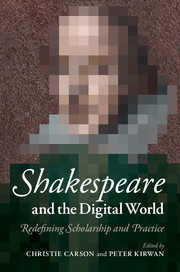Book contents
- Frontmatter
- Contents
- Notes on contributors
- Acknowledgements
- Shakespeare and the digital world
- Part I Defining current digital scholarship and practice
- 1 Shakespeare in the digital humanities
- 2 Getting back to the library, getting back to the body
- 3 Sensing the past
- 4 Webs of engagement
- Part II Defining current digital scholarship and practice
- Half-time: A pause for reflection
- Part III Redefining the boundaries and practices of Shakespeare studies online
- Part IV Redefining the boundaries and practices of Shakespeare studies online
- Index
- References
4 - Webs of engagement
Published online by Cambridge University Press: 05 July 2014
- Frontmatter
- Contents
- Notes on contributors
- Acknowledgements
- Shakespeare and the digital world
- Part I Defining current digital scholarship and practice
- 1 Shakespeare in the digital humanities
- 2 Getting back to the library, getting back to the body
- 3 Sensing the past
- 4 Webs of engagement
- Part II Defining current digital scholarship and practice
- Half-time: A pause for reflection
- Part III Redefining the boundaries and practices of Shakespeare studies online
- Part IV Redefining the boundaries and practices of Shakespeare studies online
- Index
- References
Summary
The prospects of the digital humanities are enticing: it facilitates low-cost publication and wide dissemination of scholarship that may not have been supported by traditional print mediums; it can provide access to primary and secondary sources that are difficult to acquire or search, unless one’s university is particularly well resourced; it enables alternative visual layouts and online features that print simply cannot furnish. Yet the transition from print to web is often made with little planning or critical reflection. Allowance for maintenance and development of projects beyond the term of the grant used to fund their creation is often inadequate. The permanence of online resources is frequently and mistakenly taken as a given. But most troubling, to my mind, is the uncritical assumption that a project’s merits are unequivocally enhanced if the project is digital. As scores of online projects consisting merely of keyboarded texts testify, simply posting content online does not, in itself, constitute added value. So why go digital?
The emphasis has to fall on the scholarship and the merits of the project, which may happen to be augmented by the electronic environment: after all, whilst some scholars are well versed in highly technical matters, the majority remain early modernists first, and practitioners of digital humanities second. I certainly fall under this category. Drawing on the work of the Lost Plays Database (a research site built on wiki software and the premise of interactive exchange), this chapter explores the possibilities afforded by collective and dynamic database building, including issues of quality control and the changing perceptions of what constitutes academic publication. When Roslyn L. Knutson and I began collaboration on this project, we had no firm commitment to the online environment. The creation of the Lost Plays Database as an electronic resource was thus the product of extensive deliberation over the nature of the research task and the benefits of the various forms it might take. It was driven by need and by perceived value rather than by any ideological commitment to the digital platform (in the first instance) or by specialist knowledge of wiki-coding and web publishing.
- Type
- Chapter
- Information
- Shakespeare and the Digital WorldRedefining Scholarship and Practice, pp. 43 - 56Publisher: Cambridge University PressPrint publication year: 2014



